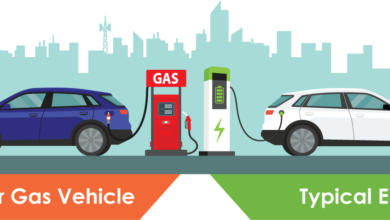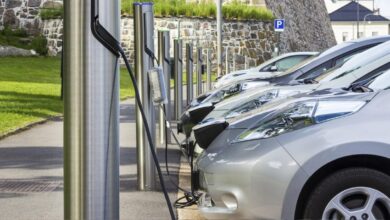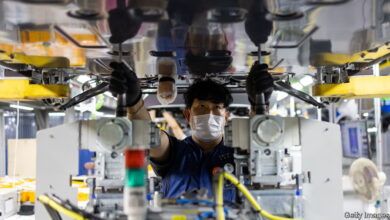
Ford Scales Down EV Production at Michigan Plant
Ford Scales Down EV Production at Michigan Plant: A recent announcement from Ford has sent ripples through the automotive industry, as the company revealed its decision to scale down EV production at its Michigan plant. This move has sparked a flurry of questions about the future of Ford’s electric vehicle strategy and its potential impact on the broader EV market.
The decision comes amidst a complex interplay of factors, including evolving market dynamics, fluctuating demand, and ongoing supply chain challenges. The move highlights the ongoing adjustments and adaptations that automakers are navigating as they navigate the transition to a more electrified future.
Market Factors Influencing the Decision

Ford’s decision to scale down EV production at its Michigan plant is likely influenced by a complex interplay of market factors. These factors encompass the current state of the EV market, including demand, competition, and supply chain challenges, which are all impacting the automotive industry as a whole.
Demand and Consumer Sentiment
The demand for EVs is undeniably growing, but it is not happening at the pace some analysts predicted. While sales have been increasing steadily, the overall market penetration remains relatively low compared to traditional gasoline-powered vehicles. This can be attributed to several factors:
- High Purchase Price:EVs are generally more expensive than comparable gasoline vehicles, making them less accessible to a broader range of consumers. This price difference is partly due to the higher cost of battery technology.
- Limited Charging Infrastructure:The availability of charging stations is still a major concern for many potential EV buyers, particularly those living in rural areas or who frequently travel long distances.
- Consumer Concerns:Some consumers remain hesitant about EVs due to concerns about range anxiety, battery life, and the environmental impact of battery production.
Intensified Competition
The EV market is becoming increasingly competitive, with established automakers like Ford facing stiff competition from both established players like Tesla and new entrants like Rivian and Lucid Motors. This intense competition is driving down prices and forcing manufacturers to invest heavily in research and development to stay ahead of the curve.
Supply Chain Disruptions
The global supply chain disruptions caused by the COVID-19 pandemic and the ongoing geopolitical tensions have significantly impacted the automotive industry, including the production of EVs. The availability of key components like semiconductors and battery materials has been affected, leading to production delays and higher costs.
Economic Uncertainties, Ford scales down ev production at michigan plant
The global economic outlook is uncertain, with inflation and rising interest rates putting pressure on consumer spending. This economic uncertainty can impact the demand for EVs, as consumers may prioritize essential spending over discretionary purchases like new vehicles.
Ford’s EV Production and Sales Performance: Ford Scales Down Ev Production At Michigan Plant

Ford’s decision to scale down EV production at its Michigan plant raises questions about the company’s overall EV strategy and its ability to compete effectively in the rapidly growing electric vehicle market. To understand the implications of this decision, it is essential to analyze Ford’s recent EV production and sales performance and compare it to its competitors.
Ford’s EV Production and Sales Performance
Ford has been making significant investments in its EV portfolio, aiming to become a leading player in the electric vehicle market. However, its EV production and sales figures have not yet met expectations. Ford’s EV production has been hampered by supply chain disruptions and other challenges.
For example, in 2022, Ford was forced to reduce production of its F-150 Lightning pickup truck due to a shortage of battery components. These production delays have resulted in lower-than-anticipated sales figures.
Ford’s EV Sales Performance
- In 2022, Ford sold approximately 15,617 F-150 Lightning trucks, a significant number but far below the initial sales targets.
- Ford’s Mustang Mach-E also faced challenges, with sales falling short of expectations.
Comparison to Competitors
Ford’s EV sales performance pales in comparison to its main competitors. Tesla remains the dominant player in the EV market, with strong sales and production figures. Other competitors, such as General Motors and Volkswagen, are also making significant strides in the EV market.
Comparison with Tesla
- Tesla delivered over 1.3 million vehicles in 2022, significantly exceeding Ford’s EV sales figures.
- Tesla’s production capacity and sales performance are far ahead of Ford’s, highlighting the gap in EV market leadership.
Implications of Production Adjustments on Ford’s EV Sales Targets
The decision to scale down EV production at the Michigan plant could have significant implications for Ford’s EV sales targets. While Ford has not explicitly stated how this decision will impact its overall EV sales goals, it is likely to lead to a decrease in production and, consequently, sales.
Potential Impact on Sales Targets
- The reduction in production capacity could result in lower sales figures for Ford’s EV models, potentially impacting its ability to meet its sales targets.
- The scaling down of production could also affect Ford’s ability to ramp up EV production in the future, making it difficult to catch up to competitors.
Potential Impacts on the Michigan Plant and Workforce
Ford’s decision to scale down EV production at its Michigan plant will likely have significant consequences for the facility and its workforce. While the company aims to maintain a strong presence in the state, the adjustments could lead to job losses and economic challenges for the local community.
Impact on Employment Levels and Job Security
The production cutbacks could lead to a reduction in the workforce at the Michigan plant. The extent of job losses will depend on the specific nature of the production adjustments and the company’s plans for redeploying workers. While Ford has stated its commitment to retraining and redeploying affected employees, some workers may face challenges in finding new positions within the company or in the local labor market.
Impact on the Local Economy
The Michigan plant plays a significant role in the local economy, contributing to employment, tax revenue, and overall economic activity. A reduction in production at the plant could lead to a decline in economic activity in the surrounding area.
This could impact local businesses, suppliers, and the overall economic health of the region.
The ripple effect of job losses and reduced economic activity could have a cascading impact on the local community.
Future Outlook for Ford’s EV Strategy
Ford’s decision to scale down EV production at its Michigan plant is a significant development, but it doesn’t necessarily signal a shift in the company’s overall commitment to electrification. While the company may be adjusting its production plans in the short term, it remains steadfast in its long-term vision for a future with electric vehicles.
Ford’s Continued Investments in EV Technology
Ford is committed to investing in its EV technology, aiming to be a leader in the industry. The company has several key areas of focus:
- Battery Technology:Ford is investing heavily in battery technology, partnering with companies like LG Energy Solution and SK Innovation to develop next-generation batteries that offer longer range, faster charging, and lower costs. For example, Ford has announced plans to build a new battery plant in Kentucky, further emphasizing its commitment to battery technology.
- Electric Vehicle Platforms:Ford is developing new EV platforms, such as the dedicated EV platform for its Mustang Mach-E and F-150 Lightning, which offer greater flexibility and efficiency in producing electric vehicles.
- Charging Infrastructure:Ford is actively investing in charging infrastructure, recognizing the importance of a robust charging network for widespread EV adoption. This includes partnerships with companies like ChargePoint and Electrify America, as well as investments in its own charging solutions.
Impact of Production Adjustments on Long-Term EV Goals
The production adjustments at the Michigan plant are likely to have a limited impact on Ford’s long-term EV goals. While the company may experience a temporary slowdown in production, it has already made significant investments in EV technology and infrastructure, and it remains committed to its electrification strategy.
The company’s overall EV strategy is likely to remain intact, with the production adjustments being a strategic move to optimize production and manage demand. This approach ensures that Ford can continue to invest in research and development, expand its EV portfolio, and maintain a competitive position in the rapidly evolving electric vehicle market.
Future Direction of Ford’s EV Strategy
Ford is expected to continue expanding its EV portfolio in the coming years, focusing on a diverse range of vehicles, including SUVs, trucks, and even commercial vehicles. The company is also expected to leverage its existing strengths in the truck and SUV segments, developing electric versions of popular models like the F-150, Bronco, and Explorer.
These vehicles are expected to be major contributors to Ford’s EV sales in the future.Ford is likely to further expand its partnerships and collaborations with other companies in the EV ecosystem, such as battery suppliers, charging infrastructure providers, and software developers.
These partnerships will be crucial for Ford’s success in the long term, enabling the company to access cutting-edge technologies and accelerate its EV development.
Epilogue

The decision to scale down EV production at the Michigan plant raises important questions about Ford’s long-term EV strategy. It’s a reminder that the road to widespread EV adoption is not without its hurdles. As the market continues to evolve, automakers like Ford will need to remain agile and adaptable to stay ahead of the curve.
Only time will tell how this decision will ultimately shape the future of Ford’s electric vehicle journey.





